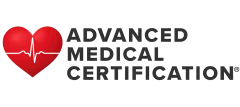ACLS vs. ALS
When researching advanced medical certifications, you’ll often see ACLS (Advanced Cardiovascular Life Support) and ALS (Advanced Life Support) used interchangeably. While they are closely related and do overlap in many cases, they don’t quite mean the same thing.
What is ACLS?
Advanced Cardiovascular Life Support is designed to reach the best possible outcome for patients going through a life-threatening event. It teaches healthcare professionals evidence-based responses that are easy enough to memorize and use in stressful moments.
These ACLS guidelines and protocols have been put together through the experience of experts in the field, patient case studies, clinical studies, and years of research. The curriculum, which is published by the InternatTional Liaison Committee on Resuscitation (ILCOR), is the gold standard in the United States and around the world.
What is ALS? 
Advanced Life Support is the broader international term often used in countries like the UK, Australia, and by organizations such as the Red Cross. ALS covers the same advanced interventions as ACLS, but is not limited to cardiovascular emergencies. Instead, it emphasizes a more comprehensive resuscitation framework that integrates respiratory management, post‐arrest care, and broader critical care interventions. ALS training also follows theILCOR guidelines and is sometimes considered the umbrella under which ACLS sits.
ACLS vs ALS: Key Differences
Let’s get deeper into the specific details that distinguish these two certifications.
ACLS is a specific program designed primarily for managing adult cardiac emergencies. It follows structured, protocol‐driven training under the ILCORE guidelines.
ALS, on the other hand, is a broader, international term encompassing a wider range of advanced life‐saving procedures. It includes ACLS‐level interventions but can also extend to pediatric emergencies, trauma care, advanced airway management, and critical care interventions.
| Feature | ACLS | ALS |
|---|---|---|
| Scope of Practice | Specific, protocol‐driven program focused on cardiac emergencies | Broader umbrella covering ACLS, PALS, trauma, and advanced interventions |
| Primary Focus | Adult cardiac arrest, arrhythmias, acute coronary syndromes, stroke | Cardiac + pediatric resuscitation, trauma, airway, post‐arrest care |
| Guidelines | ILCOR protocols | ILCOR, Resuscitation Council UK, Australia, global standards |
| Target Audience | U.S. healthcare providers (hospitals, clinics, emergency medicine) | Regional standard in UK, Australia, Europe; broader umbrella |
| Recognition | Widely required in the U.S. and internationally accepted | ALS is the wider category, but AMC’s ACLS courses meet and exceed international standards |
Treatment Protocols
While both certifications train healthcare providers in resuscitation and advanced emergency care, the protocols differ slightly depending on the governing body:
- Patient Conditions:
ACLS trains providers to treat adult cardiac arrest, tachycardia, arrhythmias, ACS, stroke
ALS focuses on providing care for cardiac emergencies but may also cover pediatric resuscitation, trauma, and advanced critical care scenarios - Medications Used:
ACLS emphasizes cardiovascular drugs such as epinephrine, amiodarone, adenosine, and vasopressors
ALS may include the same medications plus additional pharmacology for airway, trauma, and pediatric‐specific interventions - Equipment Required:
ACLS teaches about ECG monitors, defibrillators, advanced airways, IV/IO access tools
ALS trains on all of the above, with potential additions for broader resuscitation and trauma management
Certification Differences
Although ACLS and ALS prepare providers for similar types of emergencies, the certification pathways differ in scope, skill set, and delivery. ACLS certification is concentrated on adult cardiac emergencies. The curriculum covers cardiac arrest management, advanced airway techniques, arrhythmia recognition, defibrillation and cardioversion, pharmacology, and post‐cardiac arrest care. In short, it’s designed for healthcare providers in acute and emergency care settings.
ALS certification encompasses everything that ACLS covers while extending its scope to incorporate PALS‐level pediatric resuscitation modules, trauma response scenarios, and field stabilization skills.
Getting an ACLS Certification
Advanced Cardiac Life Support focuses on algorithmic interventions for adult patients, including delivering chest compressions, advanced airway management, ECG interpretation, IV/IO access, defibrillation, cardioversion, and the administration of cardiovascular medications like epinephrine and amiodarone.
You can complete AMC’s ACLS online certification in as little as an hour, though most learners take several hours to review the study guides, videos, and algorithms in detail. Our course awards up to 8 AMA Category 1 Credits™, is compliant with current ILCOR and Joint Commission standards, and includes unlimited exam retakes.
Also, AMC’s certifications are all accepted nationwide and internationally recognized, so you don’t have to worry about it being applicable to your role. We’ve designed our program to eliminate wasted time and to allow you train at your own pace with full access to support staff seven days a week.
Getting an ALS Certification
ALS certification provides a wider scope of practice that’s designed for critical care providers, paramedics, and physicians working in regions where ALS is the recognized framework. ALS courses vary in length depending on the provider and region, with classes often spanning multiple days.
Outside the U.S., ALS certification is commonly offered by the Resuscitation Council UK, Australian Resuscitation Council, and other ILCOR‐affiliated organizations. In the U.S., ACLS is the primary advanced life support credential. AMC’s advanced cardiac life support course aligns with ILCOR standards, ensuring it meets or exceeds the competencies taught under international ALS designations.
What Are the Prerequisites and Requirements?
ACLS
- You typically need to a have a current Basic Life Support (BLS) certification before enrolling
- You should be a licensed healthcare professional, such as a physician, nurse, paramedic, anesthesiologist, or respiratory therapist working in hospitals or emergency settings.
- Certification is valid for two years, after which recertification is required to stay current with evolving guidelines.
ALS
- Assumes proficiency in BLS as a foundation.
- Typically required for advanced practitioners in regions where ALS is the recognized standard.
- Often applies to those with pediatric or trauma responsibilities, such as paramedics, flight medics, or critical care providers.
- Certification validity and renewal requirements vary by country, but generally follow a two‐year recertification cycle.
- When Will You Need ACLS?
It’s standard for an ACLS certification to be a requirement for jobs in hospital and critical care environments, such as an emergency room (ER), intensive care unit (ICU), operating room (OR), and telemetry unit. That’s because the people who work in these settings face life‐threatening cardiac emergencies every day and need to be able to quickly recognize and intervene when a patient is experiencing cardiac arrest, arrhythmias, and acute coronary syndromes.
ACLS is also required for nurses, physicians, anesthesiologists, respiratory therapists, and members of designated code teams. These are the people who are called to respond when a patient is experiencing an in‐hospital cardiac emergency. Basically, ACLS certification is a baseline expectation for anyone involved in resuscitation and advanced cardiac care.
When Will You Need ALS?
ALS certification is most often required in prehospital and emergency response settings, where providers are the first line of defense in stabilizing patients before they reach the hospital. This includes EMS professionals, paramedics, flight nurses, critical care transport teams, and rescue personnel who manage patients in uncontrolled environments. The workers in these roles need to be trained in quickly securing an airway while in the field, delivering emergency medications, or providing life‐saving defibrillation during patient transport. This certification is primarily for healthcare professionals across regions like the UK, Europe, and Australia.
 Understanding Levels of Certification: ALS, ACLS, PALS, and BLS
Understanding Levels of Certification: ALS, ACLS, PALS, and BLS
Resuscitation training is structured in levels, with each certification designed for a specific scope of practice and patient population.
ALS (Advanced Life Support):
ALS serves as an umbrella term that can encompass multiple advanced programs, including ACLS, PALS, and, in some regions, trauma care. It represents the broader framework for advanced resuscitation training under international standards.
BLS (Basic Life Support):
BLS is the foundation for all healthcare providers. It covers core skills like high‐quality CPR, use of an AED, and airway obstruction relief. This certification is a prerequisite for more advanced credentials and is required across almost every healthcare role.
ACLS (Advanced Cardiovascular Life Support):
ACLS is focused on adult cardiovascular emergencies and builds on BLS skills by adding advanced airway management, ECG interpretation, pharmacology, and electrical therapies.
PALS (Pediatric Advanced Life Support):
PALS is designed for healthcare professionals caring for infants and children. It emphasizes pediatric‐specific assessment, airway management, resuscitation, and team dynamics in pediatric emergencies.
Together, these certifications form a tiered training system, ensuring that providers have the right skills for their role.
Know the Certification That Matches Your Career
Broadly speaking, you’re going to need ACLS training if you work in the United States and ALS if you work in the UK, Australia, or Europe. For healthcare professionals in the U.S.m you can get the foundational skills of BLS, the adult cardiac focus of ACLS, or the pediatric expertise of PALS with AMC. Just choose the program that aligns with your career ensures you’re prepared for the emergency care scenarios you’ll face.
AMC makes it simple to get certified or recertified with online courses that are ILCOR‐aligned, CME‐accredited and accepted nationwide. With your courses, you get unlimited exam retakes, flexible pacing, and the training to help you meet employer requirements and provide life‐saving care. We invite you to start your certification today:
- Learn more about ACLS Certification
- Explore AMC’s full range of Online Certification Courses
- Visit the AMC Home Page for additional resources and bundles
Take the next step with AMC and choose the certification pathway that best best equips you for emergency care scenarios.

